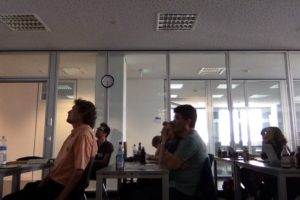
This workshop held July 9 to 11, 2018, focused on methods that leverage localized, numeric atom-centered orbital (NAO) basis functions, a choice upon which a number of the strongest available electronic structure developments are founded. The workshop brought together key players from the FHI-aims code and related European and international efforts to highlight, discuss, and advance the state of the art of NAO-based modeling of molecules and materials based on the first principles of quantum mechanics. This workshop covered three days and 23 invited talks, covering:
- development of community-based, shared infrastructure projects for electronic structure theory (Garcia, Larsen, Pouillon),
- benchmarking efforts to assess and improve the accuracy of approximations used in electronic structure theory (Al-Hamdani, Goedecker, Liu),
- applications of density functional perturbation theory (Laasner, Raimbault, Shang),
- automation of workflow via machine learning and “big data” efforts (Ghiringhelli, Hoja),
- scalability towards large systems and exascale computational resources (Huhn, Scheurer, Yu),
- numerical algorithms and new methods for NAO-based electronic structure theory (Hermann, Ringe, Rossi), and
- extensions beyond standard Kohn-Sham DFT (Golze, Havu, Michelitsch, Oberhofer, Ren)
A poster session with 14 posters contributed by workshop participants was held on the first night. Afternoons and evenings were reserved for “Hands-On Discussions”, in which participants split up into small groups to focus on topics of specific interest ranging from methodological improvements all the way to code development questions related to specific subgroups of participants and joint programming sessions. A list of topics that were addressed during these hands-on sessions included:
- Tutorial sessions for various EST and computational packages:
- the massively parallel genetic algorithm code GAtor
- the build system generator CMake
- the Atomic Simulation Environment
- the Electron Structure Library software bundle
- Method development:
- improving convergence of the SCF cycle,
- modeling van der Waals interactions for real materials,
- Code development:
- code development best practices for distributed software projects
- maintaining test suites to ensure binary reliability,
- controlling dependencies to ensure compilation across multiple platforms
